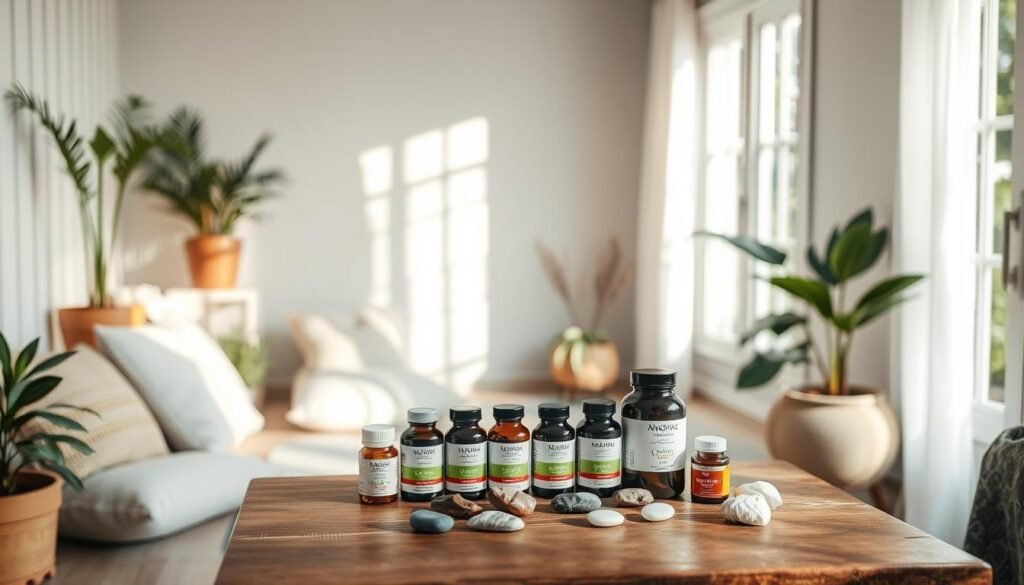A review covering 24 studies found that vitamins and herbs can greatly help with anxiety treatment. Nearly 19 million American adults suffer from anxiety disorders each year. Finding effective treatments is crucial. Among many options, vitamins stand out for their impressive health benefits. Research shows that using vitamins for anxiety is becoming a popular and successful strategy for emotional well-being.
Let’s look at one person’s journey to overcoming anxiety with vitamins. Specifically, B vitamins have a big impact on mood and brain chemicals. As more people seek natural anxiety remedies, understanding these nutrients is key. Knowing how vitamins support mental health can reveal ways to reduce anxiety and boost happiness.
Key Takeaways
- Natural remedies for anxiety can be as effective as traditional medications.
- A deficiency in essential vitamins may contribute to worsening anxiety symptoms.
- Vitamin B6, B9, and B12 play crucial roles in serotonin production and mood regulation.
- Incorporating vitamin and mineral supplements into your daily routine can support mental well-being.
- Consulting with healthcare professionals ensures safe and effective use of supplements.
Understanding Anxiety and Its Impact
Anxiety is a common mental health issue in the U.S., affecting many people every year. Over 19% of adults face anxiety disorders annually. It shows up as feelings of nervousness, restlessness, and stress, disturbing daily life and happiness.
Anxiety does more than make you feel upset; it can cause headaches, fatigue, and eating changes. It touches many parts of life, like hanging out with friends, doing well at work, and keeping up relationships.
Getting the right diagnosis for anxiety disorders is key. There are different types of anxiety, and each needs its own treatment. The emotional weight of anxiety highlights the need for effective ways to manage it. These include therapy, lifestyle tweaks, and trying natural solutions.
Knowing the signs and effects of anxiety disorders is crucial for handling them well. Symptoms vary in intensity and can challenge people deeply. This calls for a comprehensive treatment plan. It aims at better coping skills and a stronger mental health.
| Symptoms of Anxiety | Potential Effects |
|---|---|
| Nervousness | Difficulty concentrating |
| Agitation | Physical health issues |
| Tension | Social withdrawal |
| Fatigue | Impact on work performance |
Exploring Natural Remedies for Anxiety
Feeling anxious can be tough. Luckily, there are natural ways to tackle anxiety symptoms without only using medication. Techniques like working out, meditating, and writing in a journal help calm the mind. Regular exercise can cut down the chance of feeling anxious. A 2021 study found that active people had a 60% lower risk of anxiety than inactive ones.
Trying mindfulness and meditation is also helpful. A 2023 study showed that a special type of meditation was as good as the antidepressant Lexapro in easing anxiety. So, if you’re dealing with ongoing worry, these practices might be a good support. Writing down your thoughts and feelings can also be a way to deal with emotions.
Herbal supplements are another option. Herbs like chamomile, lavender, and valerian may have calming effects. In 2016, research found chamomile helped people with generalized anxiety disorder. But, with valerian, the results are mixed, and more studies are needed.
Eating well is key for managing anxiety. Vitamins like B-complex and C are important for mood and keeping the nervous system healthy. They help lower cortisol, which is a stress hormone that goes up when we’re worried. But, talk to a doctor before trying new remedies to make sure they’re safe.
- Chronic anxiety can disrupt daily functioning.
- Exercise significantly lowers the risk of anxiety.
- Mindfulness meditation offers comparable benefits to certain medications.
- Natural remedies for anxiety include herbal supplements like chamomile and valerian.
Different natural methods can work along with usual treatments for anxiety. It’s crucial to talk to healthcare providers. This can help tailor a personal and effective plan for managing anxiety.
How I Cured My Anxiety With a Vitamin
Vitamins play a big role in how we feel every day. They help control our mood and how well we think. People with anxiety often try natural ways to feel better. Taking the right vitamins can help ease anxiety and improve mental health.
The Role of Vitamins in Mental Health
Vitamins do more than just improve our physical health. They are crucial in fighting anxiety too. For example, Vitamin B12 is important for our brains. It controls the chemicals that affect our mood. Not having enough B12 can make people feel anxious or depressed.
Scientific Evidence Supporting Vitamin Therapy
Studies prove that vitamins can make us feel better. One study showed that Vitamin B6 could really cut down stress and anxiety. People who took Vitamin B6 felt less anxious than those who didn’t. This shows that vitamins can be a big help in dealing with anxiety. Check this study for more info on how vitamins can help.
Best Vitamins for Anxiety Relief
Anxiety impacts millions, affecting health and life quality. Adding certain vitamins to daily routines helps reduce anxiety symptoms. This discusses top vitamins for anxiety and their benefits.
Vitamin B Complex: Essential for Brain Health
Vitamin B complex is key for brain health. B6 and B12 help make serotonin and dopamine. Adequate levels can decrease anxiety symptoms. Taking B vitamin-rich supplements may be effective.
Vitamin C: Antioxidant and Mood Enhancer
Vitamin C is known for its mood-boosting antioxidants. Research shows it can reduce anxiety levels. It fights oxidative stress linked to anxiety. Adding Vitamin C-rich foods or supplements may help.
Vitamin D: Sunlight and Its Psychological Benefits
Vitamin D offers psychological benefits. A study showed taking 1,600 IU of Vitamin D daily helped anxiety. Many with anxiety lack Vitamin D. Sun exposure or taking supplements like MegaFood Vitamin D3 improves mental well-being.
Learning about top vitamins for anxiety aids in managing it effectively. For more details on supplements, visit this resource for a deep dive into various options.
Other Natural Supplements to Consider
Besides vitamins, there are natural supplements that help ease anxiety. They bring various benefits and can enhance the effects of vitamins. Adding these supplements could improve your mental health and balance your emotions.
Magnesium and Its Effects on Anxiety
Magnesium is key in soothing the nervous system. About half of Americans don’t get enough magnesium. So, supplements are often needed. Not having enough magnesium can make anxiety worse. But, magnesium helps lower anxiety levels. It acts as a natural relaxant and is crucial for anxiety relief.
Zinc: Importance for Mood Regulation
Zinc plays a vital role in mental health. It helps control neurotransmitters, which affect our mood balance. Lack of zinc can cause more anxiety and depression. Taking zinc regularly can improve mood and might help ease anxiety. Its role in emotional health is very important for those dealing with anxiety.
Herbal Alternatives and Their Benefits
Herbal supplements for anxiety are popular for their calming effects. Herbs like chamomile and valerian root help reduce anxiety symptoms. Chamomile tea can help you relax. Valerian root increases GABA in the brain, lowering anxiety. Also, lavender essential oil has been shown to lessen anxiety and improve sleep. Trying these herbal remedies can be a natural way to manage anxiety.
| Supplement | Benefits | Notes |
|---|---|---|
| Magnesium | Calms the nervous system | Common deficiency; aids anxiety relief |
| Zinc | Mood regulation | Essential for neurotransmitter function |
| Chamomile | Promotes relaxation | Well-known herbal tea for calming effects |
| Valerian Root | Increases GABA levels | Supports relaxation and sleep quality |
| Lavender Essential Oil | Reduces anxiety and sleep disturbances | Effective when taken in capsule form |
How to Incorporate Vitamins Into Your Daily Routine
Adding vitamins to your daily life needs a careful plan that meets your health needs. It’s key to know your body’s lacks to choose the right vitamins, especially for anxiety. Talking to health experts gives custom tips, and picking high-quality supplements ensures safety and results.
Assessing Your Nutritional Deficiencies
Finding out what you’re missing is the first step. Vitamins and minerals, like magnesium and vitamin D, are important for anxiety. You can check your diet or keep a food diary. Blood tests offer a clear view, leading to the right supplements.
Consulting with Healthcare Professionals
It’s crucial to talk to doctors before starting vitamins. They offer advice that fits your health background and anxiety issues. This way, you avoid risks and get the most from your vitamin plan.
Selecting Quality Supplements
Choosing good supplements means checking a few things. They should be:
- Third-party tested for quality.
- Free from artificial additives and allergens.
- Formulated with bioavailable ingredients for easier absorption.
- Transparent regarding ingredient sourcing.
High-quality options, like Cooper Complete Advanced B Complex, pack vital B vitamins. These are key for brain health and mood. Choosing wisely boosts mental and overall health.

| Vitamin | Common Deficiencies | Potential Benefits |
|---|---|---|
| Vitamin B1 (Thiamine) | Memory loss, anxiety | 250 mg can help relieve anxiety |
| Vitamin D | Mood disorders | Taking extra can improve anxiety |
| Omega-3 Fatty Acids | General anxiety | 2000 mg daily may reduce symptoms |
| Folic Acid | Depression risk | 1 mg daily boosts antidepressant effects |
Complementary Lifestyle Changes for Managing Anxiety
About 40 million adults in the U.S. have anxiety disorders. This is about 18% of adults. Many look for lifestyle changes to help with anxiety along with other treatments. Changing everyday habits can improve mental health and lower anxiety symptoms.
The Power of Exercise and Physical Activity
Exercise is great for managing anxiety. It makes you healthier and releases endorphins to improve mood. The U.S. Department of Health and Human Services says being active can lower anxiety. Adding walks, jogs, or yoga to your day can really help.
Mindfulness and Meditation Techniques
Mindfulness and meditation help you relax and think clearly. They lower anxiety through deep breathing and focusing on now. Doing these regularly can help you handle stress and anxiety better. They are key in making lifestyle changes for anxiety.
Healthy Diet and Its Connection to Mental Health
Eating right is key for feeling emotionally good. The food we eat affects our mental health. Eating omega-3s, B vitamins, magnesium, and antioxidants can reduce anxiety. Drinking 6 to 8 glasses of water daily also reduces stress. Foods like proteins in the morning and complex carbs help keep blood sugar stable. They also make more serotonin, which calms the brain. For more info on food and mental health, visit this resource.
Adding these lifestyle changes can improve how you manage mental health. Exercising, practicing mindfulness, and eating well can help lower anxiety. This creates a complete approach to reducing anxiety symptoms.
The Holistic Approach to Anxiety Treatment
A comprehensive strategy is key in treating anxiety effectively. It includes various forms of therapy. By combining vitamin therapy with traditional treatments like cognitive-behavioral therapy (CBT) and medications, a holistic approach is formed. This way, it looks at mental health from all angles, improving recovery and overall well-being.
Integrating Vitamin Therapy with Traditional Treatments
Research supports the use of vitamin supplements to lessen anxiety symptoms. For example, a common issue among those with anxiety is low vitamin B12 levels. Addressing this can lead to better mental health. This combined method strengthens the treatment plan by meshing CBT’s psychological benefits with the physical boost from vitamins.
The Importance of Mental Health Support Systems
Having a strong support network is vital for anyone facing anxiety. This network should include family, friends, and professionals who offer support and understanding. Support systems are key to building emotional strength. They help individuals use therapy techniques and manage anxiety more effectively. Methods like journaling positive emotions and practicing mindfulness become stronger with good social support. Studies prove that these factors create a healing environment.

Adopting a holistic approach to anxiety treatment allows for a mix of vitamins, traditional therapies, and solid support systems. This comprehensive strategy encourages a diverse set of methods for better mental health management. Ultimately, it leads to improved health outcomes for those dealing with anxiety.
Potential Risks of Vitamin Supplements
Vitamin supplements have benefits, but also potential risks. It’s important to know these risks. This knowledge is key for safe supplementation. Knowing about vitamin toxicity is a must. It stops bad health effects. Sticking to recommended amounts lowers these risks.
Understanding Vitamin Toxicity
Vitamin toxicity happens with too many vitamins. This is true for fat-soluble vitamins like A, D, E, and K. Taking too much iron can cause issues like nausea and liver damage. Always talk to a doctor before starting vitamins. Remember, the FDA does not check these products before they’re sold. So, being careful is crucial.
Interactions with Medications
Certain supplements, like vitamin K, might change how blood thinners work. Also, some herbs could make bleeding more likely or affect surgery. The FDA tries to keep unsafe products off the market. They set safety standards for making supplements. Talking to a doctor is key, especially if you take other meds or have health issues.
Personal Journey: Overcoming Anxiety
Anxiety often starts unnoticed and can begin early in life, driven by childhood fears. Some fear break-ins or worry about a parent traveling for work. A person shares their story of facing anxiety, which escalated when moving to New York City for grad school. The excitement turned into overwhelming stress, resulting in sleepless nights and dependence on alcohol and drugs.
Initial Symptoms and Struggles
After a panic attack, they were diagnosed with panic disorder and started medication. They used these medications daily for four years, seeing them as a permanent solution. Yet, they still felt stuck in a loop of anxious thoughts and physical discomfort.
Discovery of Vitamin Benefits
Everything changed when they discovered the impact of nutrition on mental health. They learned about the gut-brain connection and how diet affects anxiety. Research showed that lacking certain nutrients, like magnesium, zinc, and vitamin D, worsens anxiety symptoms. They realized poor nutrition could lead to more anxiety bouts.
Long-Term Results and Improvements
Armed with this knowledge, they approached anxiety with a new philosophy that focused on diet. Over time, this method led to significant improvements. They learned to view anxiety symptoms as steps in their recovery. Now, they not only cope with anxiety but also aim for new heights, like running a half marathon. This marks a profound change in their life.

| Aspect | Details |
|---|---|
| Initial Symptoms | Tightness in the chest, poor sleep, reliance on substances |
| Panic Attack Diagnosis | Panic disorder, prescribed medications |
| Years on Medications | 4 years |
| Cures Attempted | 17 different approaches |
| Research Time | ~10,000 hours |
| Health Professionals Consulted | 2 gastroenterologists, 3 general practitioners, 2 psychologists |
| SSRI Trials | 2 different SSRIs |
| Progress Reflection Duration | Last few weeks |
| Physical Goals | Training for a first half marathon |
Conclusion
This article shows how vitamin therapy is key in easing anxiety. We learned that vitamins like B6 and D are crucial. They not only boost mental health but also lessen anxiety and depression symptoms. People with mental health issues find these vitamins really helpful in their daily lives.
The lack of certain vitamins, especially vitamin D, can affect our mood. This tells us how vital it is to keep our vitamin levels right for mental wellness. Many people don’t have enough vitamin D, which points to the need for vitamins and lifestyle changes.
It’s good to take steps towards better mental health. This means talking to doctors and finding the right supplements. Adding vitamins to our lives along with making lifestyle changes offers a comprehensive way to deal with anxiety.